Politics in early Montana was shaped a great deal by a personal and professional conflict between two powerful and wealthy individuals, William Clark and Marcus Daly the “Copper Kings.” Both played prominent roles in the development of the copper resources on Butte Hill the largest copper producer in the world. These two gentlemen battled for control of not only wealth but also for political influence from the transition of Montana to statehood until Daly’s death in 1900.
The underlying cause of their feud is likely known only to Clark and Daly but there has been significant speculation from historians over the last century. Most trace the origin of the hostilities to the 1888 election for territorial delegate to congress. Mining was the dominant industry and miners tended to lean heavily to the Democratic Party; therefore, when Clark received the democratic nomination he felt his election was a foregone conclusion and when Montana became a state he would likely ascend to the Senate. Unfortunately, the election went to the republican, Thomas Carter, with the heavily democratic bastions of Butte and Anaconda voting heavily republican. Clark suspected his rival had manipulated the election to embarrass him publicly. There were reports of shift bosses at Daly’s mines changing the ballots and threats of lay-offs if Clark were elected. It has also been suggested some of Daly’s faithful may have voted more frequently than allowed by law; many say that is a long held Butte tradition.
Some speculate Daly’s motives were strictly economic; a republican congressman would have more influence in Harrison’s administration and Daly hoped to quell significant reforms to the timber industry which would have adversely affected his holdings. Another theory holds that Daly was a strong Irish Catholic as were most of his employees and their rejection of Clark was just a North American extension of the war between the Green and the Orange. Clark was a Northern Irish Protestant. In fact, in one of Clark’s early campaign speeches he defamed a popular leader in the Irish Home Rule movement by accusing him of desertion from union forces. In addition, Clark held a campaign barbecue three weeks before the election on a Friday insulting the Catholic contingent by serving beef.
Following this humiliation, Clark’s hunger for political office and Daly’s efforts to thwart him shaped nearly every aspect of state politics to include the capital location but also indirectly affected national politics by changing how future senators would be selected. Both men served as delegates to the State Constitutional Convention and when statehood was ratified in 1889, Clark set his sights on an office concordant with his wealth and power, a U.S Senate Seat. At that time senators were elected by state legislators and to Clark’s misfortune the first Montana legislature was deadlocked. Each party had an equal representation but five seats from Butte were disputed due to voting irregularities. Each party claimed the seats and when no resolution was forthcoming each contingent met separately and elected a separate slate of senators. When both senate delegations arrived in Washington the republican congress voted to seat Wilbur Sanders and T.C. Power thus Clark was sent home disappointed.
Clark and Daly’s forces entrenched again when Sander’s seat needed to be filled in the 1893 legislative session. This time there was not the controversy associated with seating the first legislature but the representatives could not reach a majority with three Daly loyalists refusing to support Clark. This deadlock resulted in the new state being without a senator until the next legislative session. The 1894 election brought a backlash against the Cleveland administration’s recession and a republican landslide in Montana, thus both senate seats went to the victors.
Despite the defeat of his beloved Democratic Party and loss of another chance for a senate seat, Clark was elated with the election of 1894 as he had finally defeated Marcus Daly in the “Capital Fight.” The Constitutional Convention could not agree on the site of the future capital and deferred this decision to a general election. Daly had established his refinery operations in Anaconda and in essence created the city, his pride and joy. He deeply and openly wished to have the capital seated there. Clark, angry with the betrayal in ’88, put all his resources behind Helena. An open “primary” was held in the general election in 1892 with Helena coming out on top and Anaconda second but without a majority. A number of other cities also vied for the honor and ribbons from their efforts are featured in another article on this site. This set the stage for the big showdown in 1894. Both men spent vast sums of money on this campaign; one estimate speculates spending of almost $3 million, or $50 per vote cast. The spending translated into a multitude of campaign material some of which is illustrated here. Clark’s Helena prevailed by 1,906 votes with over 52,000 votes cast. It should be noted that in the census of 1890 there were only 65,000 males of voting age in Montana.
Clark’s next chance for his coveted seat came with the 1899 legislative session. The 1898 election had given the democrats a sizable majority in the house but Daly controlled the Silver Bow County (Butte) delegation denying Clark a majority. What happened next resulted in a black eye nationally for Montana’s reputation and played a significant role in the future election of senators. It seems Clark set about purchasing votes from republican and independent representatives until his election was secured. Testimony suggests bribes were as high as $30,000 per individual; quite a sum of money at that time when one considers state legislators were often farmers or small business owners. On the day Clark was seated in the Senate, Dec. 4 1899, Senator Thomas Carter (Daly’s foil in the territorial race) called upon his colleagues to reject him. Hearings followed and when the unsavory details came to light, Clark resigned to fight another day.
One would assume after such a public fiasco, Clark would fade from the scene and let matters cool. Such are the actions of the meek; for within the year Clark would battle again for his cherished seat. This time he would join forces with the charismatic Augustus Heinze a new power in the Butte mining scene. Heinze had frequently battled Daly in the courts winning resources by exploiting loopholes in archaic mining law, but when Daly sold his assets to the Standard Oil Amalgamated Trust, Heinze would need a legislature sympathetic to blocking the change in venue legislation sponsored by the Amalgam.
With Daly representing the giant corporate trust, Heinze and Clark appealed to the miners and populists advocating for an 8-hour work day and union strength. Daly and Clark factions battled in Butte at the state convention in June (see ribbon from Madison County) and fragmented forming two separate democratic parties each sending delegates to the national convention in Kansas City and nominating candidates for state office. Clark’s group ran under Democratic Party title and Daly’s under the Independent Democrats (see ribbons from both conventions).
Clark and Heinze were able to form a fusion ticket with the populist and union-labor parties which all held their conventions in Helena simultaneously. Many items came out during this campaign and the legislative session that followed. Most of these items supported Clark directly or railed against Standard Oil or Amalgamated Copper. The pin with the 16 to 1, 8-hour day, pick, spade and dinner pail is often attributed to Bryan but the “Anti-Amalgamation” slogan around the top suggests it is a Clark item. The one in my collection came attached to a state convention ribbon. The Bryan trigate featuring Silver Republicans, Lee Mantle and Charles Hartman, was also put out during this campaign but neither was likely a big Clark supporter. The fusion ticket won an impressive victory; winning every statewide office and a clear majority in the house. This assured Clark his seat in the Senate which he assumed in 1901. Within days of the election returns, Daly died emotionally beaten by his adversary. Shortly thereafter, Clark would sell out to the trust which ultimately became the Anaconda Copper Company and Montana Power which dominated Montana economically and politically for many decades to come.
Clark’s bribery and corruption made public in the senate hearings contributed to the populist movement to change the election of US Senators by the ratification of the 17th Amendment to the Constitution. This provided for the direct election of senators rather than their selection by state legislatures. Augustus Heinze ultimately sold his holdings to the trust for an incredible profit but died bankrupt when he lost his fortune in the stock market controlled by players in the trust he had thwarted so long. Some have speculated his collapse was orchestrated through stock manipulations at the hands of his enemies. Montana’s early political landscape was a bit like the Jurassic ruled by interesting larger than life beings who were not afraid to throw their weight around. For more detailed presentations of this conflict I would recommend The War of the Copper Kings by C.B. Glasscock or The Battle for Butte by Michael Malone.
Bibliography
- Emmons, David; “The Orange and the Green in Montana: A Reconsideration of the Clark-Daly Feud, in Montana Legacy by Fritz, Murphy and Swarthout pp. 79-102 Helena 2002
- Glasscock, C.B.; The War of the Copper Kings 104-199 New York 1935
- Malone, Michael; The Battle for Butte 80-158 Seattle 1981
- Malone, M., Roeder, R. and Lang, W.; Montana: A History of Two Centuries 201-232 Seattle 1991
- Waldron, Ellis; An Atlas of Montana Politics Since 1864 Missoula 1958
First published in the Keynoter: Journal of the American Political Items Conservators Spring 2010
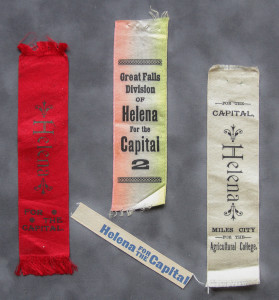
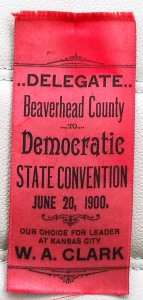
Delegate ribbon supporting Clark’s delegation to the Democratic National Convention
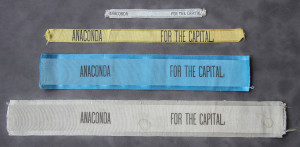
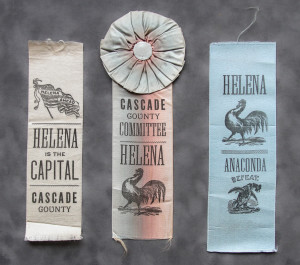
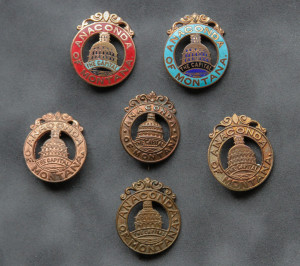
Anaconda Pins commissioned by Daly; the enameled are quite rare
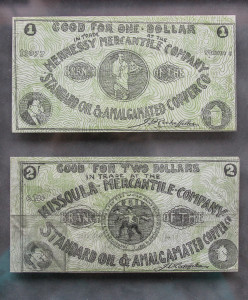
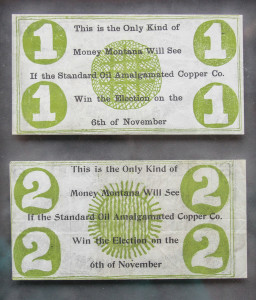
Burlesque Dollars supporting Clark 1900
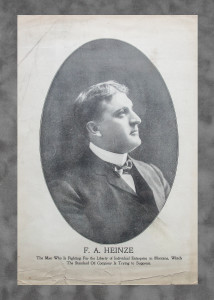
Heinz the third Copper King and a Major Clark supporter
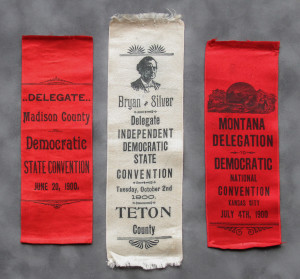
Ribbons from Daly’s Independent Democratic party
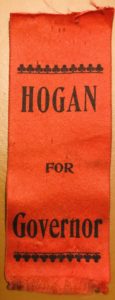
Ribbon for Thomas Hogan candidate on Daly’s Independent Democratic Ticket
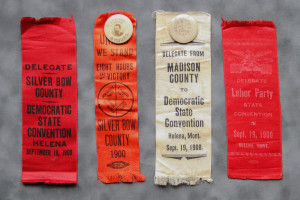
Ribbons from Clark’s fusion party
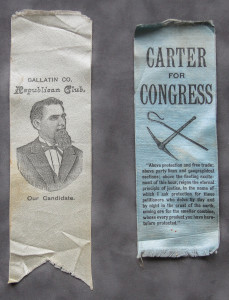
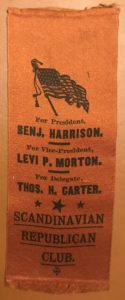
Ribbons for Carter
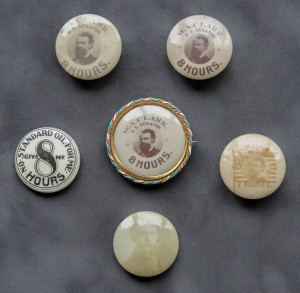
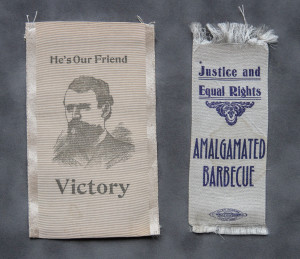
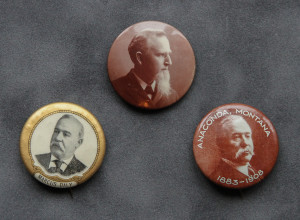
Carter and Daly pins